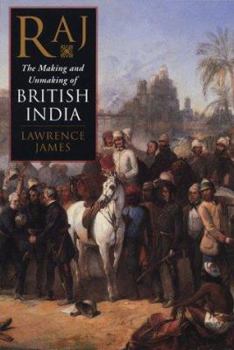Raj: The Making and Unmaking of British India
Select Format
Select Condition 
Book Overview
In less that one hundred years, the British made themselves the masters of India. They ruled for another hundred, leaving behind the independent nations of India and Pakistan when they finally... This description may be from another edition of this product.
Format:Hardcover
Language:English
ISBN:031219322X
ISBN13:9780312193225
Release Date:December 1998
Publisher:St. Martin's Press
Length:722 Pages
Weight:2.57 lbs.
Dimensions:2.3" x 6.6" x 9.6"
Customer Reviews
5 ratings
remember or repeat
Published by Thriftbooks.com User , 17 years ago
I am not finished with this book - it has rested a long time in that smallest room in the house, and I have read only a page or two at a time. I have enjoyed it greatly (the book). I find it interesting to compare the British experiences there with the US experiences in other parts of the world. I was struck at the history of the British experience in Afghanistan - and how many parallels there are with the US experience there today. I noted with interest that after some rather bad experiences that the British commanders were told that they could take an army into Afghanistan to punish or retaliate but they should on no account attempt to occupy or remain.... And I wondered if whoever advised Bush I may have read of those experiences - but whoever advised Bush II apparently was not quite so well read....
A great primer for British-Indian history
Published by Thriftbooks.com User , 20 years ago
This is an interesting and informative history book. No doubt it has a Western bias just as it would likely have a different bias if written by an Indian. Its bias should not penalize its excellence in the minds of potential readers. After all, the most interesting books have a point of view.As an American, the primary fact that I got out of this book was that India was the British Empire (after 1776). Without India, Britain would have been just another average colonial power. Therefore, the Raj is a cornerstone of British history, one sadly overlooked by basic history courses in high school and college in the US.
This is a learned and readable book
Published by Thriftbooks.com User , 23 years ago
I cannot understand why a couple of my fellow Indian reviewers disliked this book. It is certainly written from a British perspective but is generally fair and certainly not slow to point out the shortcomings of the Raj. Perhaps there are some people who cannot bear to accept the many benefits that India has gained from her contact with the British.After years of post-colonial propaganda when Indian children were encouraged to demonise their former rulers I think there is a new spirit of objectivity in our country and books like James's can be read in a mature fashion. He is particularly strong on the pre-mutiny period and underlines the 'accidental' nature of the conquest.This is the best possible introduction to the subject.
Pink Gin and Polo
Published by Thriftbooks.com User , 23 years ago
This book seems to have drawn mixed reviews because of an inherent design limitation: it is the story of "British India," from the Battle of Plessey (1759) to independence (1947). In no sense is it a history of "India" from 1759 to 1947. So the starring roles are all given to Anglo-Saxons: conqueror Clive, corrupt East India men like Hastings, ambitious Army men such as Wellington, Hough and Campbell, enlightened viceroys (Lord Curzon), explorers (Burton), young men on the make (both young Winston Churchill and young George Orwell spent their formative years on the frontier) and of course Rudyard Kipling, the Bard of Empire, who is quoted extensively. There is little analysis of nationalists such as Nehru, Jinnah and Bose, and James' hostility towards Ghandi is so sparingly articulated that one can only assume the publishers deleted a more cogent critique for legal reasons. (Under Indian law, the Ghandi estate still has the right to sue for defamation.) James also nurses misgivings about Mountbatten, who he considers overrated: he feels Mountbatten's predecessor, Lord Wavell, was underrated. Taking all these limitations on board, however, this is a fascinating European history and it tells us more about the English national character - the stiff upper-lip, the stubbornness, the sense of hard-won pride, the occasional lapses into humbug - than many a domestic drama.
Panoramic history of India under the British
Published by Thriftbooks.com User , 25 years ago
Lawrence James presents a captivating history of the tumultuous Indian subcontinent. The book shows how the British accomplished the astounding feat of uniting India under one rule. The author provides valuable insight into the turmoil between religions and castes that still troubles the subcontinent.






